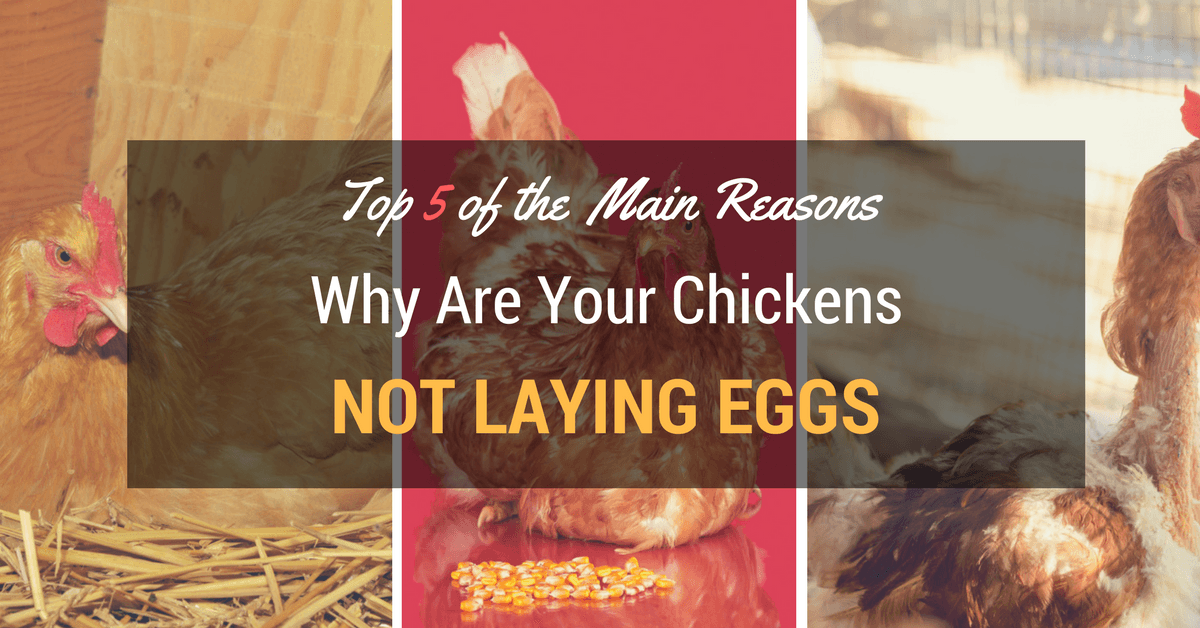Why Are Your Chickens Not Laying Eggs: 5 of the Main Reasons
There are a lot of factors to consider for chickens not laying eggs. But, this remains a problem for poultry handlers. In fact, when you observe this right away, it can help you determine the underlying causes. That is why you need to keep track of the number of eggs your chickens lay to know what is wrong with them.
There are many reasons why your hens may have stopped laying. However, you do need to rush and purchase eggs from the store right away. No worries because we are going to look at some of the most common reasons why your chickens stopped producing eggs. Also, we have provided some solutions for you to follow.
More...
Top Reasons Why Your Chickens Stopped Laying
Here is the list of factors and solutions you should try:
Chicken Diet

One of the most usual reasons why your chickens fail to lay eggs is because of their diet. You should ask yourself: have you ever altered their diet or changed their pellets for feeding? When you want to stop feeding them with layers pellets and offer them maize, you may disrupt their usual diet. Maize, as we all know, is grounded corn.
When you feed your hens with layers pellets, then you can achieve nine eggs as a minimum. But, after giving maize for a couple of days, you may notice that they decrease to just five eggs per day. So, you must remember that whatever you give your chickens, make sure that they have enough nutrients. That way, they become capable of laying eggs.
However, if you are already offering them layers pellets and they still fail to have eggs, give them snacks. Ensure that they are rich in protein, including oats, pumpkin seeds, and mealworms.
Insufficient Daylight
Even if you provide them with enough water and protein, your hens still struggle to produce eggs. Then, there might be something wrong with the sunlight they take in. For them to lay, your chickens need enough natural sunlight. In fact, they may need up to 14 to 16 hours of exposure. What you need to do is simple. You just have to put artificial lighting in their coop and assemble an electronic timer. It will allow the egg production to increase.
You Interrupted With Their Routines
You should know that your chickens have routines and when you disrupt them, you may decrease their egg production. In some cases, they may not even stop laying eggs. The most frequent habit disturbance is when you suddenly move them to a new environment and flock. It can either be when you shifted their home after you purchased them or you moved their coop.
Also, you may have bought them as pullets, so they cannot lay eggs upon arrival. However, this is natural for the moment. All you have to do is to give them a couple of days to come around the new flock, and they will begin laying eggs again.
Old Age

Some hens can lay as much as 200 eggs each year. However, when you notice that they stopped laying, then there comes the issue here. But, when chickens get older, you must take note that the number of eggs they lay may decrease over time. When your hens become older, their egg production may slow down. But, you do not need to be sad because this is an expected and natural phenomenon. Moreover, you cannot do something about this problem because it is the nature of chickens to come of age.
Illnesses May Affect Them
If you have a young, settled, well-fed chicken that takes the right diet, water, and natural daylight, but still not laying eggs, then it may be sick. Here are some of the common diseases that cause this to happen:
- Colds: You need to know if your hens have slimy nostrils. If they are opening their beaks for a long time, then they may have a hard time breathing. If so, you need to isolate them from the rest of the flock to stop spreading the colds.
- Parasites: These may include, mites, lice, and worms. You will observe that your chickens won’t stop scratching. The simplest way to treat this is to spray your chicken and coop with poultry cleaner.
- Molts: Chickens typically molt every year. In fact, it may take them up to 12 weeks to grow back their new feathers. During this period, they may fail to lay eggs.
Conclusion
If your chickens stop producing eggs, the wisest way handlers should do to determine the underlying causes. It doesn’t always mean that your hens will halt the production forever. In some cases, they may only take a few days or weeks. So, rather than drift yourself in frustration, you need to review all of the factors listed above. That way, you will also know the best solutions for each.


